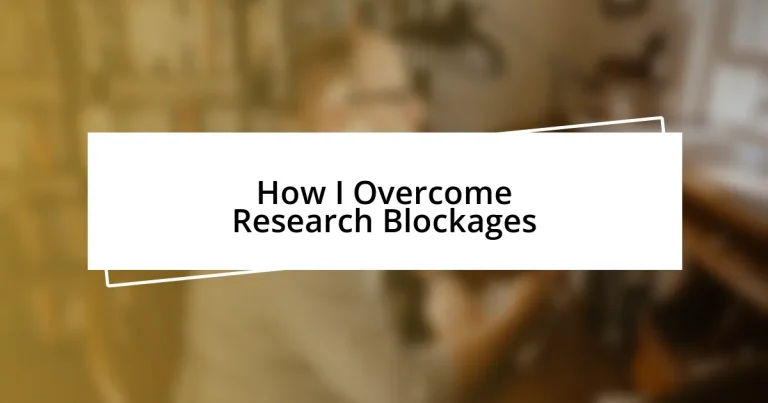Key takeaways:
- Research blockages often stem from fear, emotional fatigue, and overwhelming information, making self-reflection crucial for overcoming them.
- Identifying personal triggers, such as clutter and perfectionism, can help in managing and alleviating blockages effectively.
- Practical strategies like setting mini-goals, changing environments, and seeking peer support can significantly enhance productivity and motivation.
- Regular reflection on progress and adjusting strategies based on insights fosters sustained motivation throughout research projects.
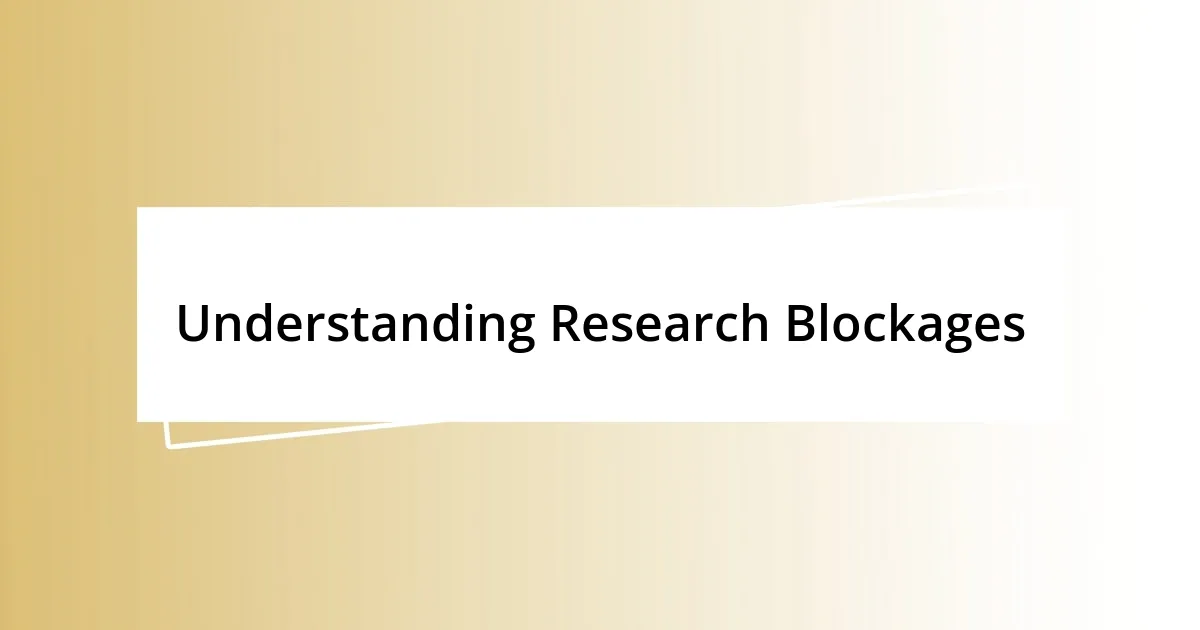
Understanding Research Blockages
Research blockages are more common than many might think. I remember facing one while working on my thesis; I stared at my screen for hours, hoping inspiration would strike. It raised the unsettling question: What was I afraid of? Sometimes, it’s about fear—fear of failure, of not being good enough, or even of diving deeper into the unknown.
These obstacles can manifest in various ways, from mental fatigue to a complete loss of direction. I’ve experienced those moments when the sheer volume of information becomes overwhelming, leaving me paralyzed. It’s almost as if the more I read, the more lost I felt. Have you ever been in that position where you know too much but feel utterly stuck? It’s frustrating, and acknowledging that blockage is the first step toward breaking free.
Another dimension to consider is the emotional toll of research challenges. I often found myself questioning my passion for the subject during these tough times. Have you felt that creeping doubt, wondering if your research is impactful? I realized that taking a step back, reflecting on why I started, helped rekindle my enthusiasm. Understanding that these roadblocks are part of the research journey can bring a sense of relief and clarity.

Identifying Your Personal Triggers
Identifying your personal triggers is like uncovering the layers of your own psyche. For me, it was crucial to pinpoint the specific situations or feelings that led to my research blockages. I remember during one particularly stressful semester, I began to notice that I would shut down whenever my workspace got cluttered. It wasn’t just a mess to clean up—it was a mental barricade that compounded my inability to focus. Have you ever realized that an external factor, like noise or a messy desk, is affecting your creativity?
Another significant trigger for me has been the pressure I put on myself to achieve perfection. Whenever I set unrealistic expectations, I could feel the energy drain away, leaving me frustrated and stalled. I noticed that acknowledging the pressure allowed me to adjust my goals to be more achievable. Reflecting on these triggers gave me a deeper understanding of how my mindset impacted my work. I think it’s essential for anyone facing similar challenges to recognize these internal and external cues, as they can be powerful barriers.
Ultimately, identifying your triggers is a continuous process. I often find myself journaling about my experiences when I face a blockage. This practice not only helps me pinpoint triggers but also serves as a form of therapy. I encourage you to take a moment to reflect on your own patterns. What are the particular feelings or situations that lead to your blockages? By understanding these triggers, you can take proactive steps to manage them.
| Trigger | Personal Insight |
|---|---|
| Cluttered Workspace | Leads to mental barricades and loss of focus |
| Perfectionism | Creates unrealistic expectations, draining energy and causing frustration |
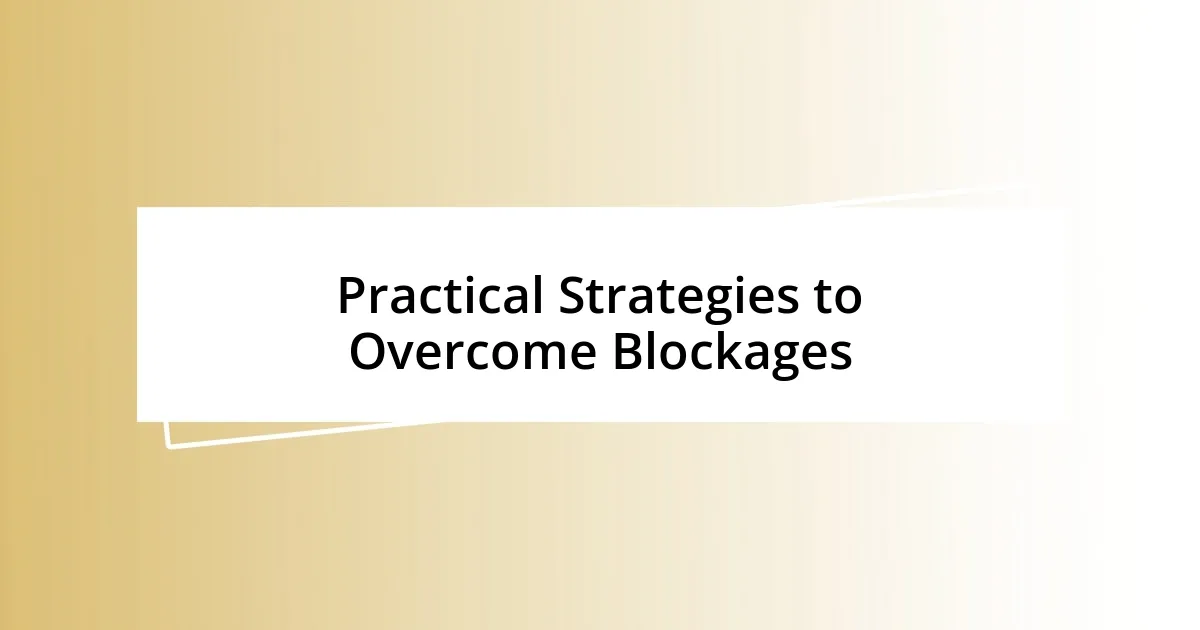
Practical Strategies to Overcome Blockages
Finding effective ways to tackle research blockages is essential for maintaining momentum. I’ve often turned to restructuring my approach as a means to regain clarity. For instance, when I felt overwhelmed by too much information, breaking my research into smaller, manageable tasks helped alleviate the pressure. It was like unwrapping a tangled necklace; taking it piece by piece made the whole process feel less daunting.
Here are some practical strategies I’ve found helpful:
– Set specific, achievable goals: Instead of aiming to finish an entire chapter, focus on just writing a paragraph or two.
– Change your environment: A new setting—like a café or a library—can spark fresh ideas and boost creativity.
– Use timed sessions: Implement techniques like the Pomodoro Technique, where you work for 25 minutes and then take a 5-minute break. This helps maintain focus.
– Incorporate movement: A short walk or stretching can clear your mind and provide a new perspective. I’ve often returned to my desk feeling rejuvenated after a brief stretch.
– Talk it out: Sometimes verbalizing your thoughts with someone else can clarify your ideas and unlock your creative flow. I’ve found that discussing my research with friends often leads to unexpected insights.
It’s a journey to explore these options, but experimenting with them can lead to significant breakthroughs and help alleviate those frustrating blockages.
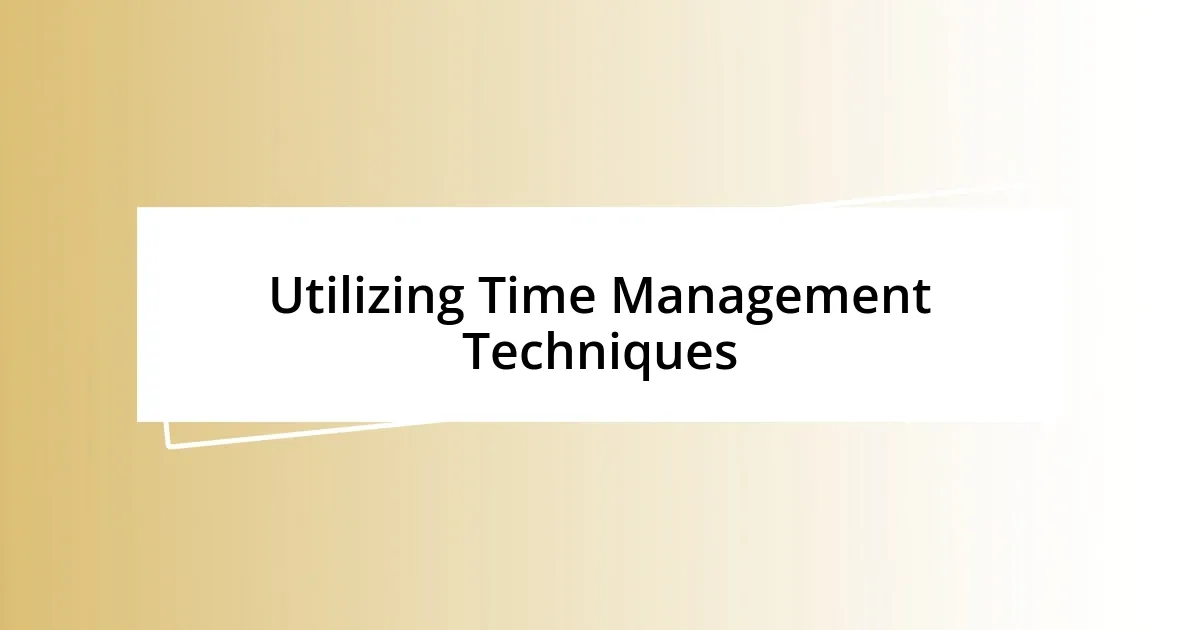
Utilizing Time Management Techniques
Managing time effectively is crucial when navigating research blockages, and I’ve experimented with several techniques over the years. One that stands out for me is the practice of creating time blocks in my daily schedule. I remember setting aside two hours each morning solely dedicated to deep work. This not only boosted my productivity but also created a sense of routine that my mind began to crave. Have you ever found that establishing a rhythm can transform your focus?
Another technique I’ve embraced is prioritizing my tasks using a simple yet powerful matrix. I categorize my research tasks by urgency and importance, which helps me see where to pour my energy first. Once, during a critical research phase, I discovered that half of my planned tasks weren’t even necessary! Realizing this freed up precious hours, allowing me to channel my efforts where they counted most. It’s a bit of a revelation when you discover how much time you can save by just really assessing what’s essential.
Moreover, I’ve found that leveraging digital tools can be a game-changer. I use timer apps that not only help me stay on track but also remind me to take those vital breaks. There are moments when I’ve gotten swept up in a task for too long, losing the freshness of my thoughts. That’s when I realized that frequent pauses don’t just prevent burnout; they rejuvenate my creativity, allowing me to return with new insights. What tools have you turned to that help keep your research on point?
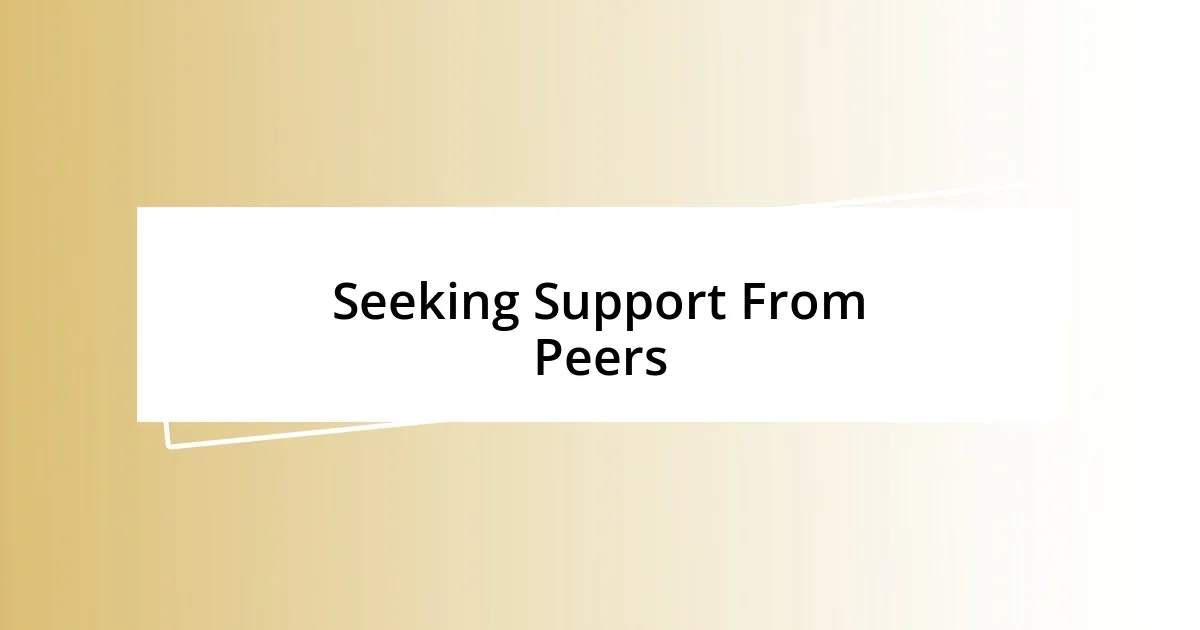
Seeking Support From Peers
Reaching out to peers when I hit a wall has always been a game changer for me. I remember one evening, feeling utterly stuck on a project, I decided to ask a close colleague for their perspective. As we talked, I was surprised by how simply vocalizing my thoughts not only clarified my ideas but also opened up a new avenue of research. Have you ever noticed how just sharing your challenges can alleviate some of the pressure?
Collaboration can be incredibly enriching; it often introduces fresh viewpoints I hadn’t considered. I once joined a study group that met weekly, and it was invigorating to brainstorm ideas together. Seeing others tackle similar challenges reminded me that I’m not alone in this journey. Isn’t it amazing how another person’s enthusiasm can reignite your passion?
Moreover, having an accountability partner has kept me motivated when the going gets tough. I remember setting weekly check-ins with a fellow researcher, and it transformed my approach. Knowing that someone else was invested in my progress pushed me to stay on track. Have you thought about how much easier it is to overcome blockages when you have someone cheering you on? Engaging with peers not only boosts morale but can lead to breakthroughs that solitary work sometimes lacks.
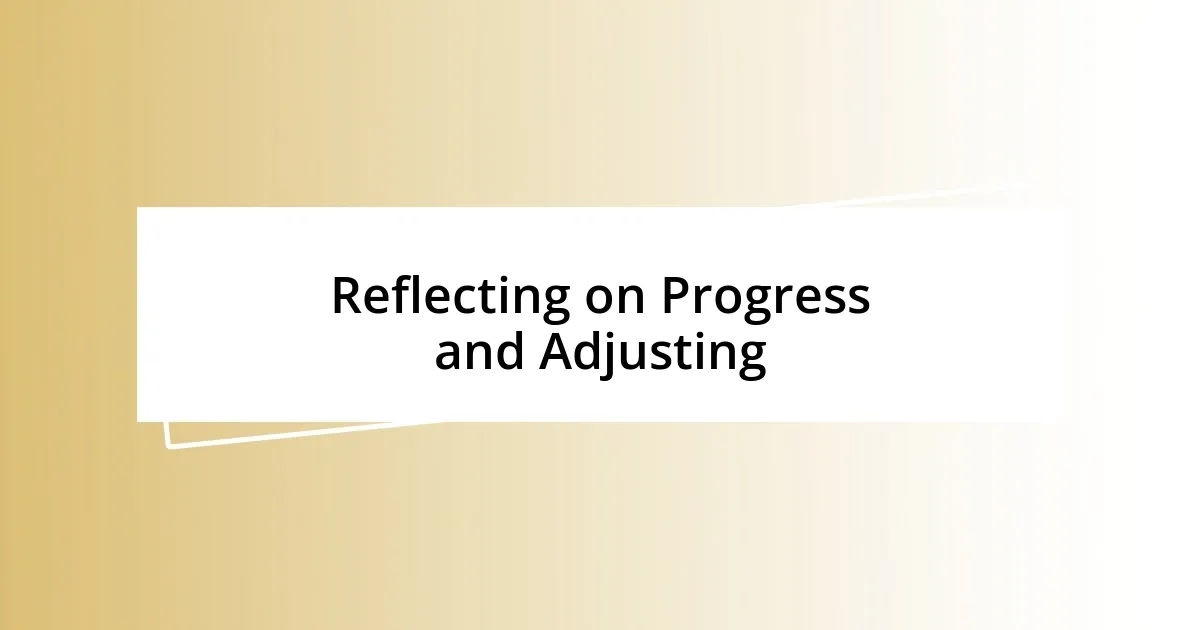
Reflecting on Progress and Adjusting
Reflecting on my progress has been a transformative practice in overcoming research blockages. I vividly recall a time when I’d poured weeks into data collection, only to realize I wasn’t moving forward. Taking a step back to evaluate what I had achieved—not just what was left to do—opened up a new perspective. Have you ever felt the weight lift when you celebrate small wins? Recognizing incremental progress can reignite motivation.
Adjusting my approach based on reflection is crucial. I once spent a month on a research paper, convinced it was the right direction, only to find it missed the main argument. After some self-assessment, I pivoted my focus and discovered a much clearer path. Learning to recognize when something isn’t clicking is essential, don’t you think? Sometimes, the courage to change direction can lead to unexpected breakthroughs.
In my experience, maintaining a reflective journal has proven invaluable. Every evening, I jot down what I’ve tackled and how I felt about it. This ritual not only tracks my progress but also highlights patterns in my working habits. I’ve noticed that my enthusiasm tends to wane during lengthy projects, prompting me to schedule mini-celebrations for completion. Does logging your journey help you uncover insights about your own patterns? It certainly does for me, helping to ensure I’m adjusting my methods to stay engaged and productive.
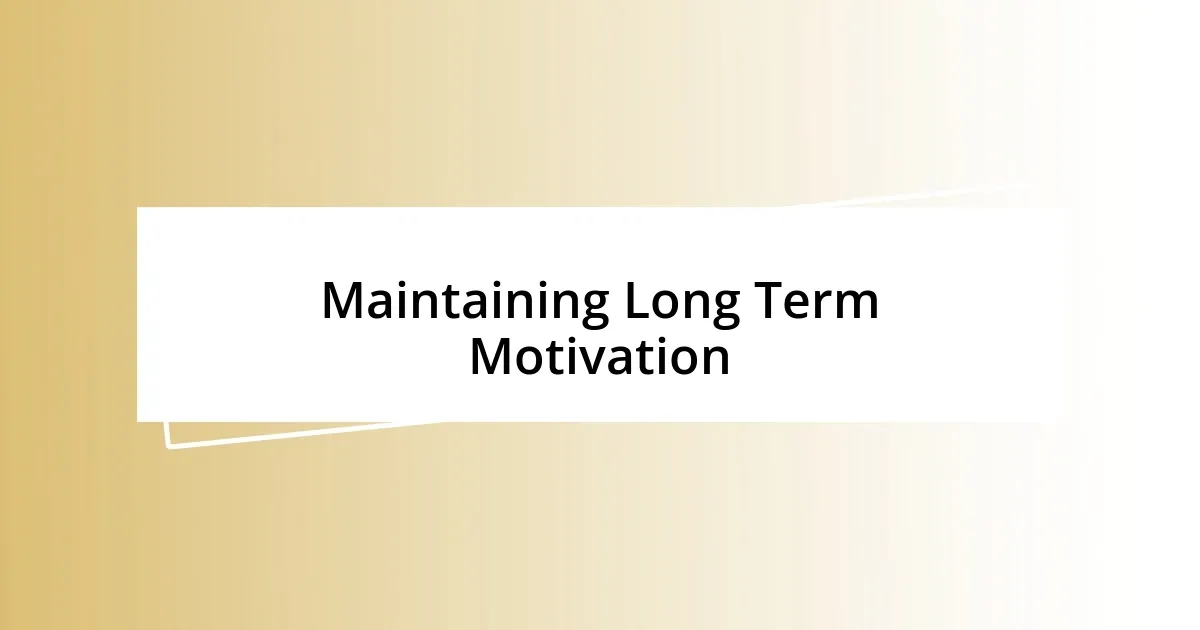
Maintaining Long Term Motivation
Maintaining long-term motivation can often feel like a juggling act, especially during extended research projects. I vividly recall a time when I had to grind through months of data analysis with no visible end in sight. It was during one of those long nights, surrounded by countless spreadsheets, that I stumbled upon a technique that really helped me: setting mini-goals. By breaking down my larger tasks into smaller, attainable objectives, I found that I could create a sense of progress, even on days when nothing felt like it was coming together. Have you ever tried celebrating these small victories?
Another strategy that has worked wonders for me is surrounding myself with sources of inspiration. There was a phase when I became utterly absorbed in the narratives of other researchers’ journeys. Watching TED talks or reading success stories reignited my zest for the work. I often wonder, what sparks your inspiration? For me, those moments reminded me of the broader impact my research could have, making the sometimes monotonous process feel meaningful.
Lastly, I’ve learned that emotional ups and downs are part of the research journey. I remember feeling euphoric when I finally cracked a tough problem, only to be hit with doubt the following week. To combat this, I started discussing these emotions with a close friend who’s also in academia. Just sharing my feelings made me realize that those doubts are temporary and, more importantly, universal. I find comfort in knowing that I’m not alone; have you checked in with your feelings lately? Embracing this emotional rollercoaster as part of my path has ultimately helped me persevere and maintain motivation over the long haul.












